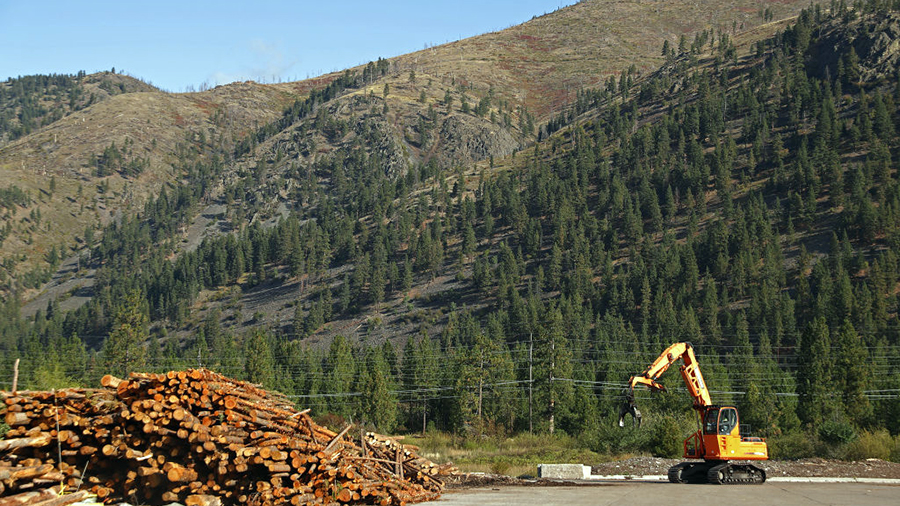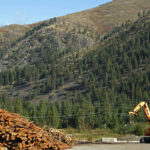Judge sides with young activists in first-of-its-kind climate change trial in Montana
Aug 14, 2023, 11:23 AM | Updated: 12:29 pm

BONNER, MONTANA - SEPTEMBER 20: Stacks of cut timber are ready for processing at Willis Enterprises, a wood chipping plant, at the Bonner Industrial Park September 20, 2019 in Bonner, Montana. As timber mills have closed or reduced volume all over the state, other businesses have evolved and developed in Montana. Once the industrial and economic center of the Missoula area, the Stimson Lumber Mill in Bonner closed in 2008 after 122 years of continuous lumber production, throwing hundreds of people out of work. Today, the 200 acre site that once produced millions of board-feet of plywood and other lumber products is now home to a pedicab manufacturer, a Bitcoin mining facility, a custom aluminum trailer manufacturing facility, a beer brewery, a concert amphitheater and a dozen other businesses. (Photo by Chip Somodevilla/Getty Images)
(Photo by Chip Somodevilla/Getty Images)
HELENA, Mont. (AP) — A Montana judge on Monday sided with young environmental activists who said state agencies were violating their constitutional right to a clean and healthful environment by permitting fossil fuel development without considering its effect on the climate.

FILE – Lead plaintiff Rikki Held listens to testimony during a hearing in the climate change lawsuit, Held vs. Montana, at the Lewis and Clark County Courthouse on, June 20, 2023, in Helena, Mont. A Montana judge on Monday, Aug. 14, sided with young environmental activists who said state agencies were violating their constitutional right to a clean and healthful environment by permitting fossil fuel development without considering its effect on the climate. (Thom Bridge/Independent Record via AP, File)
The ruling in the first-of-its- kind trial in the U.S. adds to a small number of legal decisions around the world that have established a government duty to protect citizens from climate change.
District Court Judge Kathy Seeley found the policy the state uses in evaluating requests for fossil fuel permits — which does not allow agencies to evaluate the effects of greenhouse gas emissions — is unconstitutional.
Judge sides w/ youth plaintiffs in Held v Montana. Finds MEPA limitation & changes made in SB557 to be unconstitutional. Judge finds plaintiffs have “fundamental constitutional right to a clean and healthful environment, which includes climate…” More coming @dailymontanan #mtpol pic.twitter.com/86jTyvYn0n
— Blair Miller (@blairmiller) August 14, 2023
Judge Seeley wrote in the ruling that “Montana’s emissions and climate change have been proven to be a substantial factor in causing climate impacts to Montana’s environment and harm and injury” to the youth.
However, it’s up to the state Legislature to determine how to bring the policy into compliance. That leaves slim chances for immediate change in a fossil fuel-friendly state where Republicans dominate the statehouse.
The Montana youth v. climate holding is extraordinary 🎉🎉🎉
▶️Montana’s fossil fuel actions “exacerbate anthropogenic climate change” & harm the environment and residents, especially youth
▶️ “Non-fossil fuel-based energy” is “economically feasible & technologically available” pic.twitter.com/C5ecTtxCzj— Victoria Bogdan Tejeda (@v_bogg) August 14, 2023
Attorneys for the 16 plaintiffs, ranging in age from 5 to 22, presented evidence during the two-week trial in June that increasing carbon dioxide emissions are driving hotter temperatures, more drought and wildfires and decreased snowpack. Those changes are harming the young people’s physical and mental health, according to experts brought in by the plaintiffs.
The state argued that even if Montana completely stopped producing C02, it would have no effect on a global scale because states and countries around the world contribute to the amount of C02 in the atmosphere.
A remedy has to offer relief, the state said, or it’s not a remedy at all.
Breaking News: A judge ruled that young people in Montana have a constitutional right to a healthful environment and that regulators must be allowed to consider climate impact in a first-of-its-kind climate case. https://t.co/tnh8BMi4kY
— The New York Times (@nytimes) August 14, 2023
















